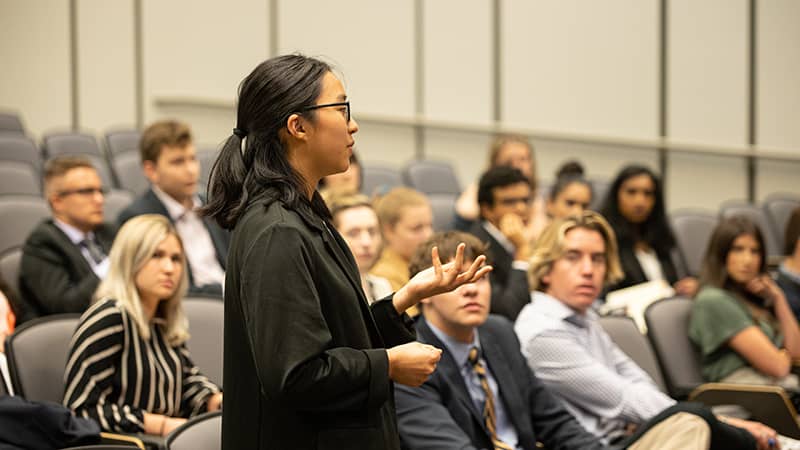
Hundreds of students travel to Washington, D.C., from around the world each year to learn the principles of limited government, free-market economics and honorable leadership through The Fund for American Studies (TFAS) Academic Internship Programs. Through internships, economics courses and one-of-a-kind networking and professional development events, TFAS students receive a well-rounded experience in the nation’s capital.
Now, TFAS and the American Council of Trustees and Alumni (ACTA) are working together to add Braver Angels debates to the TFAS curriculum. With the addition of these student-led debates, TFAS students are able to engage civilly with one another on well-researched issues pertinent to today’s political and economic climate.
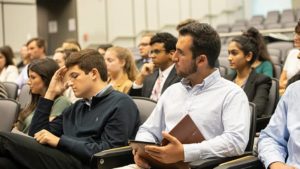
Journalism + Communications student Autumn Fink ’21 shared that the respectful discourse helped her feel more prepared to transition into life after college.
“I appreciated how peaceful this debate was because my experience with debates has not been this way,” she said. “The structure we followed helped us practice civility, and I think that prepared us to journey towards adulthood.”
TFAS hosted its first Braver Angels debate during the 2021 Spring Capital Semester program. Conducted virtually, the two-hour debate flowed smoothly and students gave positive feedback on the experience. The clear success of this event encouraged TFAS to continue working with ACTA and Braver Angels to host six more debates during the summer D.C. Academic Internship Program.
Doug Sprei, Director of Campus Partnerships at ACTA, played an active role in facilitating each of the debates among TFAS students. He was impressed with their dedication to civic discourse and grateful for the in-person interaction.
“TFAS has provided an ideal partnership opportunity for our College Debates and Discourse Initiative with Braver Angels,” Sprei said. “In each of the seven debates, we were inspired by the way TFAS students and leaders modeled respectful civil dialogue and free expression of diverse viewpoints. It was also a thrill to have TFAS co-engineer the first in-person debates we’ve launched in 16 months since the onset of the pandemic.”
Live. Learn. Intern.
TFAS’s three-point slogan, “live, learn and intern,” embodies the programming offered to students. This new partnership with ACTA will elevate the second prong of the approach during the program.
Braver Angels debates provide a positive, open environment for individuals to speak their mind on a thoroughly researched topic. Students select a topic and choose peer representatives to serve as speakers for both the affirmative and negative sides.
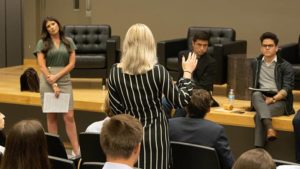
Different from the typical debate where tempers may rise, Braver Angels representatives moderate each debate to minimize tension. Students are instructed to address the moderator as “Mr./Mrs. Chair” and to refer to each other as “the speakers,” as opposed to speaking directly to one another. This eliminates the opportunity for pointed attack.
Journalism + Communications student Emily Washburn ’21 appreciated the debate style, especially the way it allowed everyone to speak.
“I like that it was fluid enough that everyone got to speak, and that it was structured enough that nobody spoke over anybody else,” she said.
Debate Topics
All students in the Summer 2021 programs participated in a Braver Angels debate. Each of the five program tracks, as well as the students completing their programs virtually, selected a topic related to their track. Students selected the following topics:
- Business + Government Relations: Should the federal minimum wage be raised?
- International Affairs: Should the U.S. intervene militarily in human rights violations?
- Journalism + Communications: Should journalists value objectivity over advocacy?
- Leadership + the American Presidency: Should the U.S. adopt an open border policy?
- Public Policy + Economics: Should the U.S. adopt a universal healthcare system?
- Virtual Students: Should vaccine passports be required for U.S. citizens?
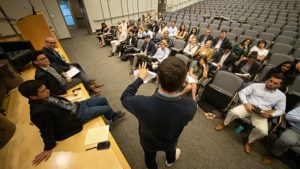
Emily Mecia ’21, a student participating in Business + Government Relations, said she’d heard positive feedback from her friends in other program tracks who had already completed their debates.
“I’m really excited for this because I’ve never participated in a debate before,” Mecia said. “I’ve heard from my classmates that it was a really cool experience and that they were able to learn a lot. I’m excited to hear everyone’s perspectives and to learn something new.”
I’ve heard from my classmates that it was a really cool experience and that they were able to learn a lot. I’m excited to hear everyone’s perspectives and to learn something new.” – Emily Mecia ’21
Debate Structure
The Braver Angels team explains the debate structure and rules before each debate. Then they read the resolution and the first speaker in the affirmative delivers a four-minute speech. Participants are then invited to ask questions and the speaker is able to respond and expound on their talking points. A speaker in the negative delivers the next speech with the same opportunity for follow-up questions, then up to two more speakers for each side deliver their speeches.
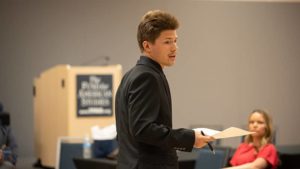
After all assigned speakers have given their speeches, other students are invited to make a speech, pose open-ended questions or open the debate up to further introspection and consideration. After approximately 1.5 hours of discussion, the debate is adjourned and the students break down their thoughts in a debrief session to close the event.
Public Policy + Economics student Jackson Still ’21 described the debate as a “filtering process” in terms of how the conversation flowed from beginning to end.
“By the end of the debate, all our thoughts were collected and eloquently stated,” Still explained. “We started with the same kind of origin of thought and worked through our differences to find common ground. The debate helped us get to that point.”
Debate Debrief
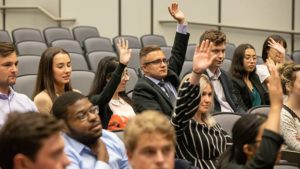
Summer 2021 students agreed that the civility maintained throughout each debate was refreshing, especially considering the tense political climate today.
Many students also shared that this style of debate was new to them. For instance, Public Policy + Economics student Justin Holloman ’21 liked that the debate was a different experience than that to which he was previously exposed.
“I enjoyed the passionate and educated side of things coming together because I’m not used to getting that at my home university,” he said.
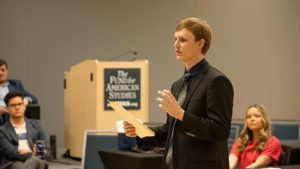
When tensions run high in tough conversations, it can be difficult to listen to others and understand their perspective, yet it is important to acknowledge other ideas. Public Policy + Economics student Jonathan Voos ’21 highlighted the importance of having these conversations, listening to those around you and learning from other opinions.
“I enjoyed that I learned new things and heard ideas I hadn’t heard before,” Voos said. “While I don’t agree with everything that was shared, I still learned a lot and I’m glad we had the opportunity to respectfully debate such a salient topic.”
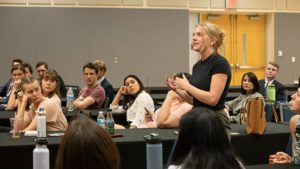
The Braver Angels team shared their excitement to host debates in person again and recognized the character of the TFAS students. Daniel Acosta Rivas, the program manager for college debates and discourse at ACTA, had glowing remarks for the Journalism + Communications students after their debate.
“This was one of the most profound displays of truth and beauty I’ve ever seen at one of these debates,” he said. “I applaud all of you for your determination in the pursuit of truth.”
This was one of the most profound displays of truth and beauty I’ve ever seen at one of these debates. I applaud all of you for your determination in the pursuit of truth.” – Daniel Acosta Rivas, ACTA Program Manager for College Debates and Discourse
Luke Phillips, the Publius Fellow for Public Discourse at Braver Angels, moderated a few of the debates this summer. He noted the quick-wittedness and intelligence of participants as a standout feature of the character of TFAS students.
“The TFAS students are very quick on their feet,” he said. “I think this is something common to the kind of student that comes to TFAS, but there were a lot of people citing very obscure thinkers, very obscure philosophers, in ways that are really, really good. Those are the kinds of references and wit that demonstrate broad minds.”

